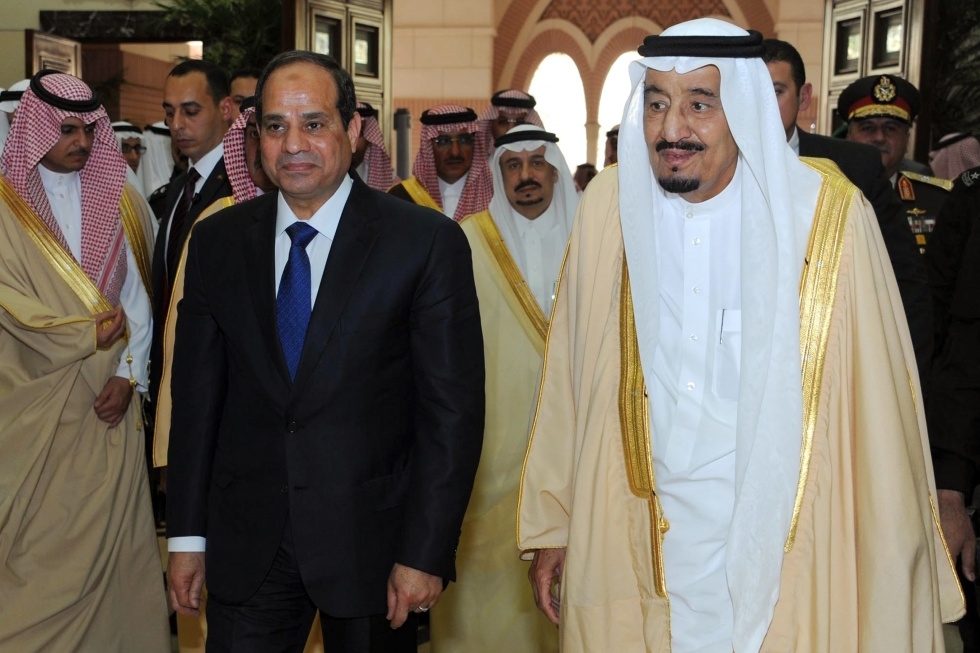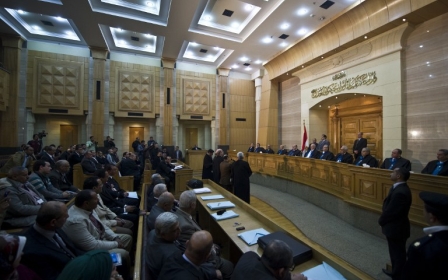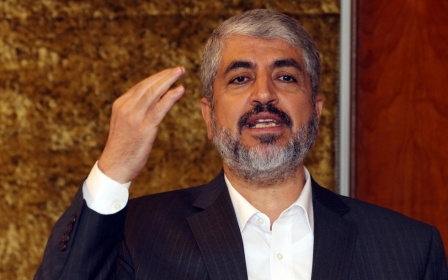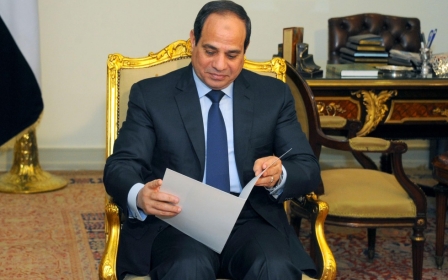Egypt's Sisi makes brief visit to Saudi Arabia, as new alleged leak to be aired

Egyptian President Abdel Fattah al-Sisi held talks in Riyadh on Sunday, coinciding with a visit to Saudi Arabia by his Turkish counterpart who he has strained relations with over the latter’s support for the Muslim Brotherhood.
Sisi and Turkish President Recep Tayyip Erdogan, whose relations have been strained since the former army chief ousted his democratically elected predecessor Mohamed Morsi in July 2013, did not meet in the oil-rich Gulf state.
Sisi's brief visit came after the pro-Muslim Brotherhood television channel Mekameleen last month broadcast a leaked audio recording in which he apparently suggests that Gulf monarchies have more money than they need and should give more to Egypt.
Sisi swiftly initiated telephone conversations with his allies in the Gulf, including with Saudi Arabia's King Salman who reportedly told him that relations with Cairo were "strategic".
Mekameleen said on Sunday they would release another leaked recording allegedly from Sisi’s office at 8pm (1800 GMT) that would include details of secret meetings with former British Prime Minister Tony Blair, former Israeli President Shimon Peres and discussions with leaders from the United Arab Emirates (UAE).
On Sunday, the Saudi monarch greeted Sisi upon his arrival, the official SPA news agency reported.
The leaders discussed "bilateral cooperation... and affirmed the deep strategic relations between the kingdom and Egypt, and their eagerness on strengthening them," said SPA.
They also held talks on "regional and international developments” and were thought to have discussed Sisi’s desire to form a pan-Arab force to fight regional “terrorism”.
Saudi Arabia, the UAE and Kuwait are the main financial backers of Sisi's government, having pledged around $12 billion to Cairo since he came to power.
In an interview with Saudi-owned Al-Arabiya news channel ahead of the visit, Sisi insisted that Cairo's relations with Riyadh were strong.
“The relationship between Egypt and Saudi Arabia, and Egypt and its brothers in the Gulf, has been strong and stable for years,” he said.
His visit came at the same time as Erdogan, who on Saturday travelled to the Muslim holy city of Mecca to perform a pilgrimage, before leaving to Medina the next day.
Sisi said the timing of the visits was a "coincidence".
But he also urged Turkey to "stop interfering in Egypt's internal affairs", in the interview with Al-Arabiya.
Cairo accuses Ankara, as well as Doha, of supporting the Muslim Brotherhood, the movement of Morsi, blacklisted by Saudi Arabia and the UAE as well as by Egypt, although Riyadh has shown signs in recent weeks that under Salman it is considering a change in policy toward the group.
Saudi Foreign Minister Saud bin Faisal said the Gulf kingdom has “no problem” with the Brotherhood, despite it being blacklisted as a terrorist organisation.
In a column published in anticipation of Sisi’s visit to Riyadh, Saudi academic Khalid al-Dakhil spoke of the “anxiety” in Egypt over the direction of Saudi Arabia under Salman, particularly with regard to the Brotherhood.
“Some people in Egypt would like Saudi support to take the form of gifts or open royal grants or a blank cheque,” Dakhil wrote. “They don’t, for instance, want Saudi Arabia to come close to Turkey because of the latter’s sympathy toward the Brotherhood.”
“The more rational political vision is that relations between Saudi Arabia and Egypt should not be subject to the position toward the Brotherhood or the position toward Turkey.”
Erdogan will meet with Salman on Monday – details on the agenda are sparse but rumour fierce that it could signal the beginning of a new strategic relationship between Saudi Arabia and Turkey.
Middle East Eye propose une couverture et une analyse indépendantes et incomparables du Moyen-Orient, de l’Afrique du Nord et d’autres régions du monde. Pour en savoir plus sur la reprise de ce contenu et les frais qui s’appliquent, veuillez remplir ce formulaire [en anglais]. Pour en savoir plus sur MEE, cliquez ici [en anglais].




